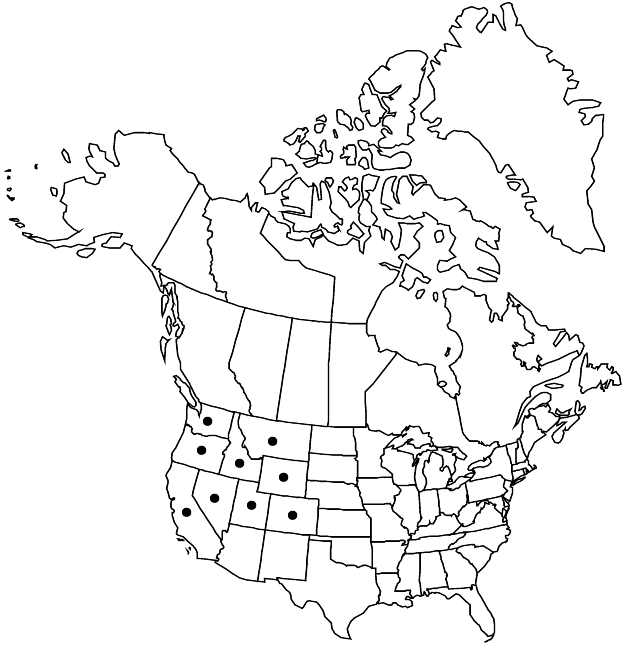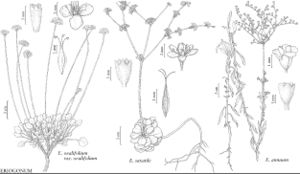Difference between revisions of "Eriogonum ovalifolium var. ovalifolium"
FNA>Volume Importer |
FNA>Volume Importer |
||
| Line 26: | Line 26: | ||
|elevation=600-2600 m | |elevation=600-2600 m | ||
|distribution=Calif.;Colo.;Idaho;Mont.;Nev.;Oreg.;Utah;Wash.;Wyo. | |distribution=Calif.;Colo.;Idaho;Mont.;Nev.;Oreg.;Utah;Wash.;Wyo. | ||
| − | |discussion=<p>Variety ovalifolium is found in eastern California, northwestern Colorado, Idaho, Montana, <i>Nevada</i>, eastern Oregon, Utah, eastern Washington, and Wyoming. It is less widespread than <i></i>var.<i> purpureum</i> and generally tends to flower earlier than that variety. The two sometimes occur together but do not seem to intergrade, although in some cases the only distinguishing feature is flower color. It is important to note that the yellowish hue of <i></i>var.<i> ovalifolium</i> will fade in some herbarium material, making identification of older or less well-preserved material difficult. Brownish leaf margins occur on specimens of <i></i>var.<i> ovalifolium</i> found in northeastern California (Lassen, Plumas, and Siskiyou counties).</p> | + | |discussion=<p>Variety ovalifolium is found in eastern California, northwestern Colorado, Idaho, Montana, <i>Nevada</i>, eastern Oregon, Utah, eastern Washington, and Wyoming. It is less widespread than <i></i></i>var.<i><i> purpureum</i> and generally tends to flower earlier than that variety. The two sometimes occur together but do not seem to intergrade, although in some cases the only distinguishing feature is flower color. It is important to note that the yellowish hue of <i></i></i>var.<i><i> ovalifolium</i> will fade in some herbarium material, making identification of older or less well-preserved material difficult. Brownish leaf margins occur on specimens of <i></i></i>var.<i><i> ovalifolium</i> found in northeastern California (Lassen, Plumas, and Siskiyou counties).</p> |
|tables= | |tables= | ||
|references= | |references= | ||
| Line 50: | Line 50: | ||
|publication year= | |publication year= | ||
|special status= | |special status= | ||
| − | |source xml=https://jpend@bitbucket.org/aafc-mbb/fna-data-curation.git/src/ | + | |source xml=https://jpend@bitbucket.org/aafc-mbb/fna-data-curation.git/src/f6b125a955440c0872999024f038d74684f65921/coarse_grained_fna_xml/V5/V5_646.xml |
|subfamily=Polygonaceae subfam. Eriogonoideae | |subfamily=Polygonaceae subfam. Eriogonoideae | ||
|genus=Eriogonum | |genus=Eriogonum | ||
Revision as of 20:09, 24 September 2019
Plants 2.5–4 dm wide. Leaf blades usually elliptic to spatulate or oblong, (1–)3–6 cm, tomentose to floccose, margins rarely brownish. Scapes erect, (4–)5–20 cm, thinly tomentose. Inflorescences capitate. 1–3.5 cm wide; branches absent. Involucres 3–15 per cluster, 4–5(–6.5) mm. Flowers 4–5 mm; perianth yellow. 2n = 40.
Phenology: Flowering Apr–Aug.
Habitat: Sandy to gravelly flats, washes, slopes, and ridges, mixed grassland, saltbush, and sagebrush communities, pinyon and/or juniper and montane conifer woodlands
Elevation: 600-2600 m
Distribution

Calif., Colo., Idaho, Mont., Nev., Oreg., Utah, Wash., Wyo.
Discussion
Variety ovalifolium is found in eastern California, northwestern Colorado, Idaho, Montana, Nevada, eastern Oregon, Utah, eastern Washington, and Wyoming. It is less widespread than var. purpureum and generally tends to flower earlier than that variety. The two sometimes occur together but do not seem to intergrade, although in some cases the only distinguishing feature is flower color. It is important to note that the yellowish hue of var. ovalifolium will fade in some herbarium material, making identification of older or less well-preserved material difficult. Brownish leaf margins occur on specimens of var. ovalifolium found in northeastern California (Lassen, Plumas, and Siskiyou counties).
Selected References
None.
